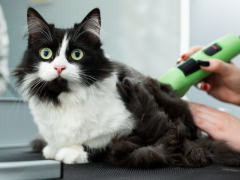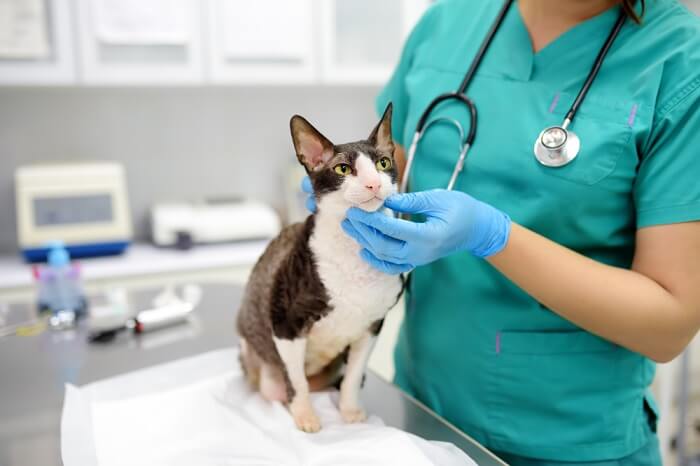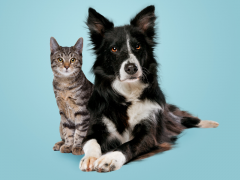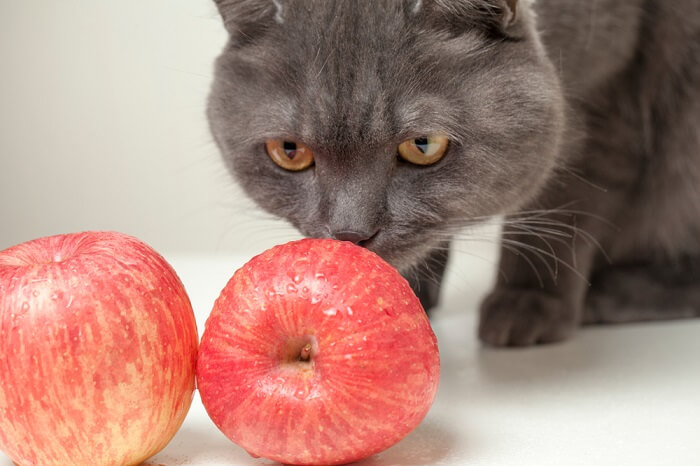
If you’ve got a curious feline, you’ve probably noticed them hanging around begging for food, or stealing from your plate. In which case, you’ve probably wondered ‘can cats eat apples?’ or ‘are apples ok for cats?’.
We’re going to look in detail at this common fruit and decide if they’re safe for your feline friends to eat.
Apples are a safe treat to give most cats, as long as they aren’t suffering from a few specific health conditions. However, it’s not yet known if cats get as many health benefits from apples. If you decide to give your cats apples as a treat, you should only give them a very small amount, as too much fibre can cause stomach upset.Quick Overview: Can Cats Eat Apples?





Summary of Content
Are Apples Good for Cats?
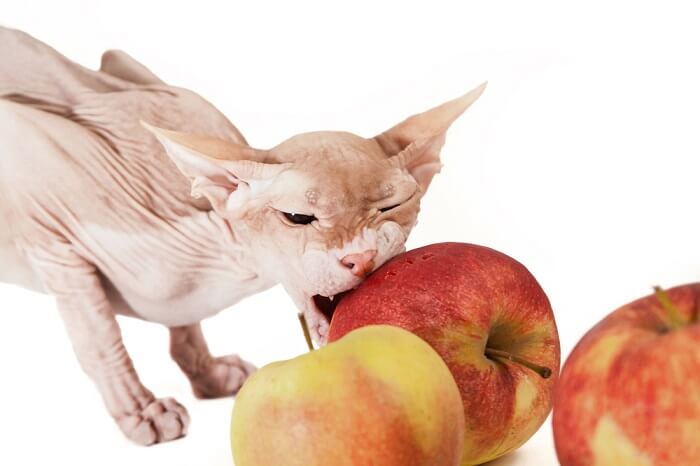
As well as being a good source of vitamins (especially Vitamins A and C) and minerals, apples are also high in antioxidants.
- Quercetin is an antioxidant found in apples that is thought to have anti-inflammatory, antiviral, and anti-cancer effects. Studies are still ongoing as to how this important antioxidant can help people.
- Chlorogenic acid is the weight-loss antioxidant found in coffee- it’s also found in apples.
- Catechin is thought to improve muscle function and brain function, according to some early studies.
As well as the benefits of antioxidants, apples are also thought to have other nutritional benefits thanks to their phytonutrients. Some studies have shown that they protect against cancers of the colon, reduce blood sugar, and lower the risk of heart disease.
Are Apples Safe for Cats?
The simple answer is yes- cats can eat apples. Apples are a safe human food for cats to eat, although many cats will not like the taste. Some sources will claim that, because cats are ‘obligate carnivores’, they cannot digest apple.
This is not true. ‘Obligate carnivore’ simply means that cats need to eat meat to survive, as they can’t get all the nutrition they need from plant sources. Cats are still able to digest apple and other plant-based foods.
Apple pomace is a pureed by-product of human apple consumption- usually the leftovers after apples have been pressed for juice and cider. Apple pomace is sometimes included in cat foods as a source of fiber.
However, as with all foods, there are a few exceptions to the rule that apple is safe for cats.
As always, apples are a ‘treat’ food, as they are not complete and balanced. That means, together with any other cat treats for the day, they shouldn’t make up more than 10% of your cat’s daily calorie allowance, with the rest of their food coming from a balanced diet.
Your cat’s meal portion should also be reduced accordingly to make sure they are not taking in too many calories.
Apples should not be given to cats with diabetes, as they are high in sugar and can cause them to become destabilised. Cats with obesity should also not have apple- they should be on a strict diet to reduce their calorific intake, and there’s not usually room for snacks like apple.
Apples should be given very cautiously to cats with IBD, sensitivity, and chronic gastroenteritis, as these cats are more prone to getting side effects from eating apples. The large amounts and combination of fibres in apples can be hard to digest, causing excess gas, an upset stomach, and diarrhea.
Other sources of apple, such as apple sauce and apple pie, should not be fed to cats, as they often contain added ingredients such as sugar and preservatives.
Are Apples Toxic to Cats?
The seeds and core of apples should not be given to cats as they contain cyanide which can be toxic.
Otherwise are generally safe, apples are high in carbohydrates, but cats are primarily carnivores- so it’s possible that their digestive system doesn’t allow them to use the nutrition in an apple as effectively as they might.
We do know, from this study, that cats can absorb the antioxidant tocopherol from apple pomace. We also know, from very recent research, that cats find apple pomace tasty- but also that apple pomace reduces the digestibility of the cat’s diet.
This means it’s being explored as an ingredient in ‘diet’ foods, as the fiber can help them feel full, whilst the calorie content of the food is lower.
With the other nutrients in apples, we’re yet to find whether or not cats can absorb them and utilize them, and therefore whether they are a healthy snack for cats.
But the good news is that, as long as your cat will eat them and they don’t suffer any side effects, eating apples is unlikely to do any harm to your cat.
Are Apples Used in Commercial Cat Food?
Apples are used in some commercial cat foods, because they provide fiber, which can support digestive health. They also contain antioxidants that help combat free radicals and support the immune system. Additionally, apples offer a mild natural sweetness, making them a natural ingredient choice in certain formulas. They are also included as a source of fiber, antioxidants, and vitamins (such as vitamin C and vitamin A). Some brands use apple pomace (the pulp left after juicing) to support digestion.
Brands That Use Apples in Cat Food:
How Much Apple Can a Cat Eat?
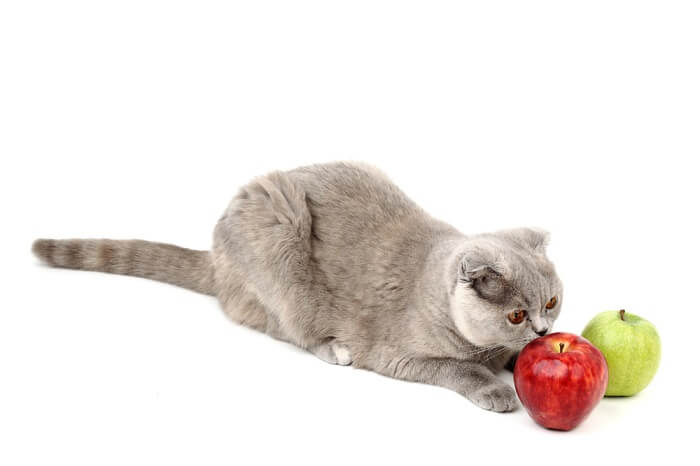
Cats should only eat very small amounts of apple at a time.
As you would with all new foods, the first time you feed your cat apple, you should ensure that you only feed them a very small amount- half a cubic inch is plenty.
You’ll then want to observe your cat for 24-48 hours to ensure that they don’t suffer any adverse effects such as diarrhea or vomiting. If all goes well, your cat can tolerate apple and she can have a little more.
As always, you should ensure that your cat doesn’t eat more than 10% of her calorie allowance from treats. This means that, theoretically, a 10lb cat that is in perfect body condition shouldn’t have more than a quarter of an apple each day, calorie-wise.
However, if they’re going to have other treats, they’ll need less- and that’s quite a lot of apple for a little cat! In reality, a few small pieces is plenty, sprinkled over their food. Alternatively, use a tablespoon of apple puree (not shop-bought apple sauce, which contains additives) mixed in with their food.
Don’t forget that your cat shouldn’t eat the pips of the apple (apple seeds), as these contain amygdalin, which is turned into cyanide when digested.
Although the amount of cyanide is small, it’s best to avoid giving apple pips to your cat. In addition, the ASPCA advises that apple stems and leaves should also never be eaten by cats and dogs.
If you decide to give your cats apples as a treat, you should only give them a very small amount, as too much fibre can cause stomach upset.
Frequently Asked Questions
Can cats eat apple slices?
Yes, plain raw apple is fine to feed your cat. However, smaller pieces are better as they are less likely to pose a choking hazard.
What fruits can cats eat?
Along with apples, cats can also eat raspberries, blueberries, bananas, and strawberries.
Can cats eat apple seeds?
Although they only contain a tiny amount of cyanide, it is not recommended to feed your cat apple seeds. Having said that, if they accidentally eat one or two they are unlikely to suffer any ill effects- simply monitor them for symptoms for a couple of days.




